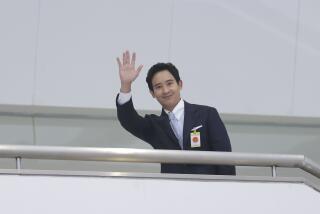DEMOCRACY : Thai Protester Who Helped Fell Junta Aims at Civilian Premier
- Share via
BANGKOK, Thailand — In May, 1992, a hunger strike by Chalad Vorachat against military rule started a chain reaction of street protests that led to the collapse of a government headed by a retired army chief.
Last week, Chalad announced he was going to resume his fast to the death. This time his target was not the influence of Thailand’s powerful military but civilian Prime Minister Chuan Leekpai, who came to power on a wave of popular support for democracy.
Chalad’s protest was perhaps the most graphic sign so far of popular disenchantment with democratic government two years after as many as 100 people were killed in clashes with the army during demonstrations demanding elected, civilian rule.
Paradoxically, among the most vocal critics of the government now are the same newly affluent business people whose support for democratic reforms was instrumental in bringing down the government of Suchinda Kraprayoon two years ago.
“A lot of people in the middle class are disillusioned,” said Amarr Siamwalla, head of the Thailand Development Research Institute, a Bangkok think tank. “The government hasn’t accomplished an awful lot. They appear to be just bumbling along.”
Chuan, who took office at the head of a five-party coalition in September, 1992, does get high marks from many analysts for trying to decentralize the economy and for keeping his government relatively corruption-free, no small accomplishment compared to the rapaciousness of past Thai governments. But Chuan is widely criticized for appearing paralyzed by indecision in the face of pressing problems such as Bangkok’s notorious traffic gridlock.
“Chuan is too cautious. He needs to be more assertive,” said Suchit Bunbangkong, a respected political analyst at Chulalongkorn University.
A frustrated Chuan complained after a particularly bruising defeat in Parliament that “it is difficult for an elected administration to please everyone. The work is even more difficult when the government is trying to do its job and uphold democratic and legal principles at the same time.”
The problem came to a head at the end of March when the ruling coalition called a special session of Parliament to consider 25 changes designed to liberalize the constitution that was drafted under a military junta in 1991.
Among the proposed changes was an amendment designed to reduce the power of the Senate, the upper house of Parliament that is filled with former military men and senior civil servants who were appointed by the previous administration rather than elected. The Senate, rebelling at the prospect of having its perquisites cut back, joined with opposition members of the lower house of Parliament and voted against the proposed democratic reforms. Instead, they adopted an entirely different constitution that was literally cut and pasted together from past charters.
The Nation newspaper, one of the loudest proponents of democracy in Thailand, called the maneuver a “quiet, sinister coup in broad daylight.” The opposition demanded that Chuan dissolve Parliament and call new elections, a demand he has so far ignored.
The political crisis is far from over. A second reading of the proposed new constitution is coming up in two months, and the same coalition of opposition parties and disaffected senators appears ready to override the government and pass its own version. If it does, Chuan may have little choice but to resign.
Chuan’s government won a brief reprieve from the barrage of criticism thanks to a timely announcement from Washington. The U.S. government disclosed Tuesday that it had seized a luxurious Beverly Hills home and Mercedes-Benz belonging to Thanong Siriprechapong, a member of Parliament for the opposition Chart Thai party, on charges they had been purchased with the proceeds of millions of dollars in marijuana sales in the United States.
While Thanong initially denied the allegations, the charges helped to revive memories of corruption in Chart Thai, which also had close ties to past military rulers. Compared to drug dealers in Parliament, Thai political analysts mused, perhaps Chuan did not look so bad after all.
More to Read
Sign up for Essential California
The most important California stories and recommendations in your inbox every morning.
You may occasionally receive promotional content from the Los Angeles Times.













